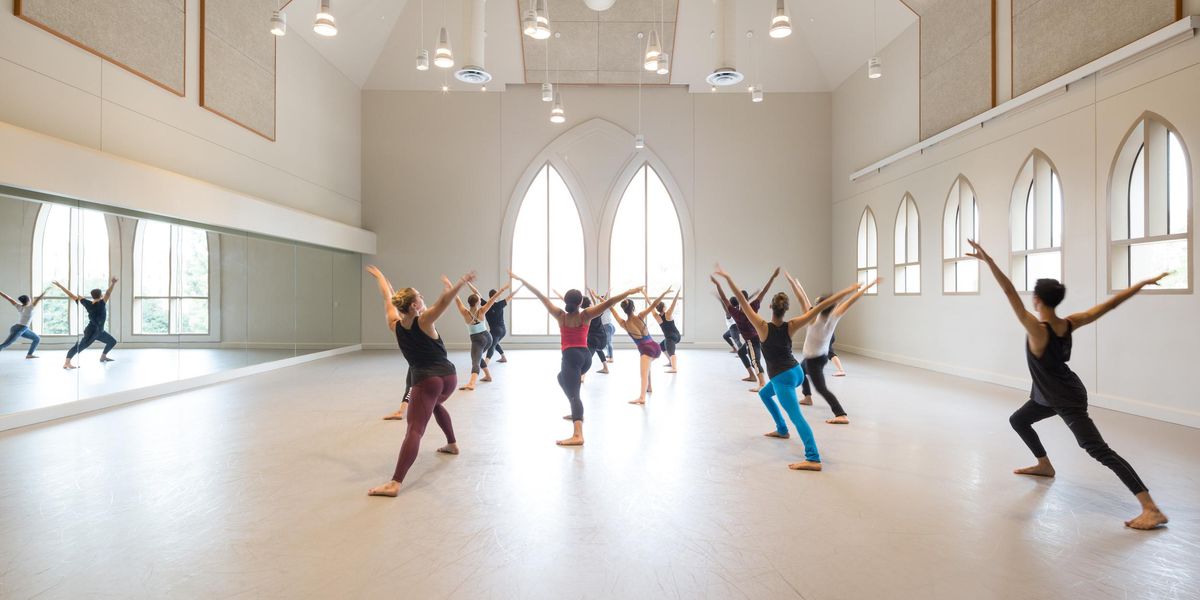2014 Summer Study Guide: Triple-Threat Training
Students rehearse with faculty members Nick Adams and Kyle Brown. Photo by Eric Antoniou, Courtesy TBC.
At first, the scene looks like the typical dance intensive: Students unwind on foam-rollers after their morning ballet class, while others review choreography. The dancers pile into the studio for jazz class, and the session begins with an athletic, pop-music filled warm-up. But just as the intensity reaches its height, the students do something unexpected, almost shocking: They open their mouths and shatter their silence, belting the chorus of Afrojack’s “Take Over Control (feat. Eva Simons)”—all the while crunching their abs in unison.
Soon to enter its fourth year, The Boston Conservatory’s Musical Theater Dance Intensive teaches dancers how to break away from the silent mentality of dance and into the realm of musical theater. Created and directed by the conservatory’s musical theater dance chair Michelle Chassé, the program answers the call to train advanced dancers who might not be as confident with opening their mouths onstage. “I know that there are a lot of dancers who want to get their foot in the musical theater door and audition with a song or monologue—but don’t know how,” says Chassé, who began her own career in ballet before transitioning into theater. On the other hand, the intensive also provides a safe space for musical theater majors to gain confidence in their dance skills.
The MTDI is modeled after TBC’s rigorous year-round program; and just like the musical theater BFA candidates, students must audition for the summer. Chassé accepts roughly 60 dancers, ages 15 to 25, and about half are rising juniors and seniors in high school. (A handful of TBC students also attend, as well as several undergrads from other musical theater programs across the country.) Students spend three hours each day in ballet and jazz classes. And in addition to voice and acting classes, there are Broadway repertory sessions, mock auditions, rehearsals for an end-of-program performance and workshops on subjects like headshots, social media and self-promotion. They learn Broadway choreography straight from faculty members who danced it, along with classic audition combinations from long-running shows like Chicago.
From the start, Chassé knew that the heart of her program would lie in its faculty, and she drew from TBC’s impressive list of alumni—including Nick Adams (A Chorus Line), Noah Racey (Thoroughly Modern Millie) and Elena Gutierrez (Mamma Mia! national tour)—making the program a celebration of the school’s Broadway success. She also makes a point of hiring voice and acting coaches who work with students year-round at the conservatory. “Nothing is dumbed down,” she says.
The dance, voice and acting faculty work together to make classes an integrated experience across the disciplines. Acting teacher Candice Brown, for example, begins her classes by having dancers express themselves through movement, before transitioning to the spoken word and monologues. And Chassé gives dancers the opportunity to be vocal in dance technique classes—hence the singing during ab work. “The faculty talk with each other and figure out how to make a common language between singing and dancing and acting,” says Emily Pynenburg, 21, a TBC musical theater student who grew up in dance competitions and dreams of dancing on Broadway. “In these ballet classes, you won’t be told to breathe a completely different way than in your singing classes.”
TBC dance division student Curtis Thomas, 22, notes that the summer program has been particularly eye-opening for him, since he’s interested in a career spanning both the concert dance and Broadway stages. “We’re challenged in the moment to make artistic choices,” he says. “There’s this whole new arena of ‘How do you express yourself? Who are you? What are you communicating?’ We’re all storytellers. Plus, with the choreography, the breathing, the sounding pretty and not getting in the way of the 30 other people onstage, it’s the ultimate multitasking.”
High school juniors often use the summer experience as a boot camp to prepare for college auditions. (Attending the MTDI won’t necessarily give you an immediate “in” to TBC, but Chassé notes that faculty members do remember their summer students come audition time.) Others, like Broadway vet Athena Ripka, 15, who played Cindy Lou Who in Dr. Seuss’ How The Grinch Stole Christmas! and Susan Waverly in Irving Berlin’s White Christmas, are beginning their college search. For her, the highlight of the program has been dancing alongside college-age dancers and getting an inside scoop. “I wanted to do a program at a conservatory to see what it was like,” she says. “Being here has answered every single question I’ve had.”
Ashley Rivers is a writer and dancer in Boston.




